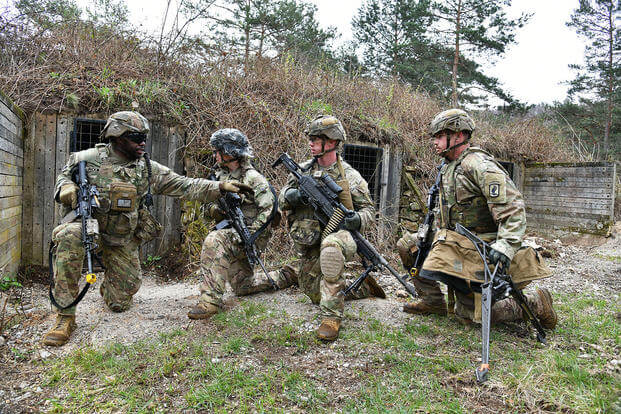

The Army said Thursday it is suspending its controversial program that promotes noncommissioned officers before they attend an academy.
The service will suspend the temporary promotions starting in June in one of the most significant changes to its promotion system in recent years, it said in an announcement. The Army will also realign required noncommissioned officer schools, moving each requirement up a rank.
The move comes as the Army grapples with how it promotes its noncommissioned officers, or NCOs. In 2016, it set a standard for completion of those academies before promotion, but soldiers have long struggled to attend the schools, either due to deployments or shortages in open seats.
"This effort requires active engagement across all echelons, and leaders will need to do their best to ensure soldiers are given the time and opportunity to attend all phases of [schooling]," Sergeant Major of the Army Michael Weimer said in a memo to the force.
The realignment in the schools means promotion to staff sergeant requires graduation from the Basic Leader Course, or BLC. Previously, that was a requirement for promotion to sergeant, which now doesn't require schooling.
However, promotion to sergeant major will still require the Sergeants Major Course.
Here are the new schooling requirements:
Soldiers recommended for promotion to sergeant who have completed the Basic Leader Course and to staff sergeant who have completed the Advanced Leader Course, or ALC, will be awarded 150 promotion points.
Temporary promotions started in 2022 as the Army struggled to get soldiers into NCO academies with an enormous backlog inflamed by the COVID-19 pandemic. The Army has promoted 112,000 NCOs since December 2021, about half of whom were temporary promotions, according to service data.
Previously, soldiers needed schooling for each NCO rank to get promoted. But temporary promotions allowed those troops to get a new rank under the proviso that they attend the relevant school within a year of their promotion, or revert back to their old rank.
The National Guard and reserve have a particularly difficult time with those schools, which can last a month or longer, as part-time troops juggle college or civilian careers. Those service components will put out separate guidance, according to an Army press release.
Meanwhile, Army leaders still want the schools to serve as a centralized checkpoint for NCOs to learn the service's standards, whether that be simple tasks such as marching or learning key policies on military justice, sexual assault prevention, and writing award recommendations.
Instructors for those courses have reported to Military.com that they often teach outdated policy, partly because changing the curriculum is arduous and involves cutting red tape, and the courses generally struggle to keep pace with service doctrine.
In other cases, some instructors interviewed have said they are generally unqualified to teach material the Army has placed a greater importance on, such as nutrition, and that the NCO academies rarely bring in subject-matter experts.
Those efforts run parallel with an overall goal of professionalizing the NCO corps, which has slowly placed a greater emphasis on civilian education such as college and soft skills. Still, Army planners are looking to add more ground combat skills to the schooling, including land navigation at the Basic Leader Course.
Related Topics: Military Headlines Army Promotions Army National Guard Army ReserveSteve Beynon is a reporter for Military.com based out of the Washington, D.C., area whose detailed investigations have covered urgent issues impacting soldiers. He has an extensive background in covering senior military leadership conduct, the Pentagon’s recruiting struggles and extremist organizations. Read Full Bio
© Copyright 2024 Military.com. All rights reserved. This article may not be republished, rebroadcast, rewritten or otherwise distributed without written permission. To reprint or license this article or any content from Military.com, please submit your request here.